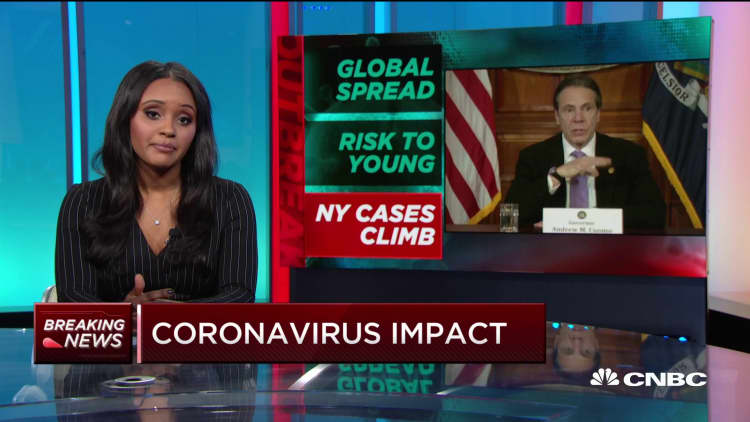Two members of the U.S. House of Representatives have become the first members of Congress to test positive for COVID-19, the illness caused by the novel coronavirus.
On Wednesday, both Mario Diaz-Balart, a Florida Republican, and Utah Democrat Ben McAdams announced they were in self-quarantine after testing positive.
At least 10 other members of Congress also announced on Wednesday and Thursday that they were in self-quarantine as a precaution because of exposure to people who have tested positive, many of whom had contact with Diaz-Balart and McAdams.
Sen. Cory Gardner, R-Colorado, announced earlier in the week that he was in self-quarantine "because I came into contact last week with a Coloradan who later tested positive for #COVID19."
On Wednesday night, a spokesman for Republican Party Chairwoman Ronna McDaniel, who had been in self-quarantine after having flu-like symptoms, said McDaniel tested negative for COVID-19.
President Donald Trump's outgoing chief of staff, Mick Mulvaney, was in self-isolation in South Carolina as of Tuesday after having contact with his niece, whose results of a coronavirus test were pending.
Diaz-Balart said in a statement, "I want everyone to know that I am feeling much better."
"However, it is important that everyone take this extremely seriously and follow [Centers for Disease Control and Prevention] guidelines in order to avoid getting sick and mitigate the spread of this virus," Diaz-Balart said.

McAdams, in his own statement, said, "I'm doing my part as all Americans are doing to contain the spread of the virus and mitigate the coronavirus outbreak."
During an interview on NBC's "TODAY" show, McAdams said that the illness feels like "worst cold I've ever had."
"I felt like I had a belt around my chest, and so I couldn't breathe deeply," said McAdams.
He also said that any other lawmaker who had close contact with him since last Friday "should be concerned and should probably take precautions."
McAdams said that the "few members that I had contact with in that period probably should be quarantined."
On Thursday morning, Rep. Tom Cole, R-Okla., said that he has entered self-quarantine through March 27 "out of an abundance of caution" because he was around Diaz-Balart "for an extended period last week."
"I have no symptoms and feel fine," Cole said.
Republican Rep. Steve Scalise of Louisiana said Wednesday that he was in self-quarantine because of contact with Diaz-Balart.
"Fortunately, I am not experiencing any symptoms, and will continue working remotely on Congress' Coronavirus response," Scalise said in a statement.
Two other Republican House members are known to be in self-quarantine, albeit without testing positive for COVID-19: Drew Ferguson of Georgia and Ann Wagner of Missouri.
Democratic House members who said on Wednesday and Thursday that they are in self-quarantine as a precaution are Kathleen Rice and Anthony Brindisi of New York, Andy Kim of New Jersey, Matt Cartwright of Pennsylvania and Stephanie Murphy of Florida.
The Attending Physician of Congress said in a statement said, "My office has taken appropriate actions to identify any individuals who require additional monitoring for periods of quarantine. The office has adopted a very conservative guideline to identify individuals who may have come into contact with the ill Members during the pre-symptomatic period of March 13th."
"The office has additionally reviewed possible exposures among staff members and has assessed other areas involving the calendars of the affected individuals. The Office of Attending Physician has identified the offices and locations that were found to be at risk and these have been treated by the Architect of the Capitol, using CDC approved cleaning methods to ensure there is no residual risk to others."


